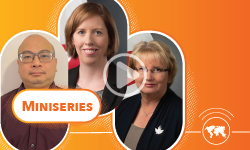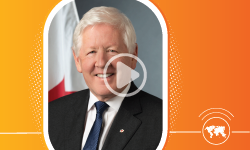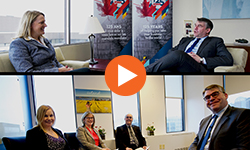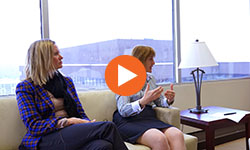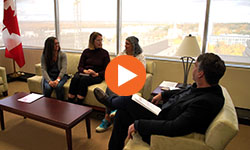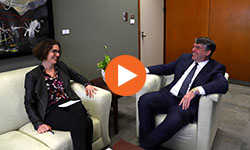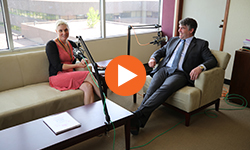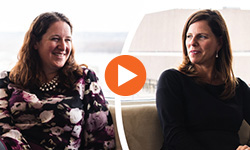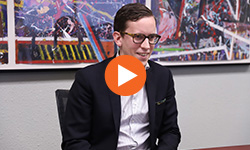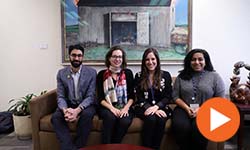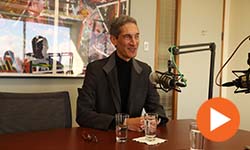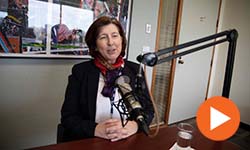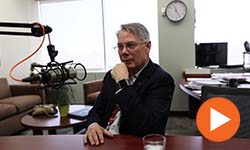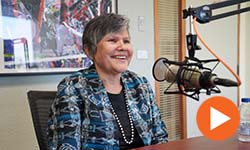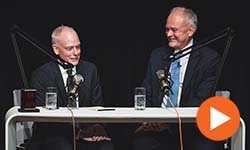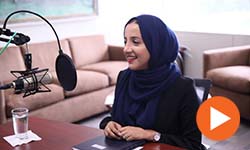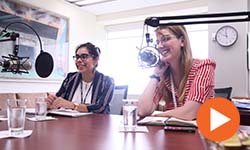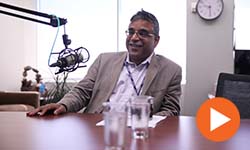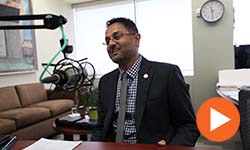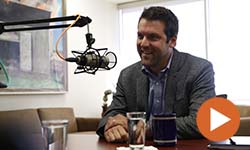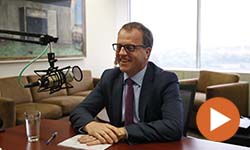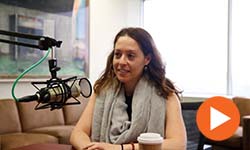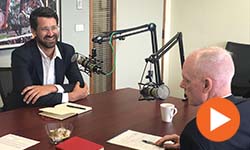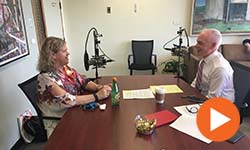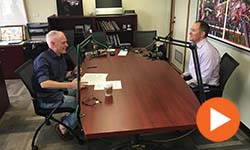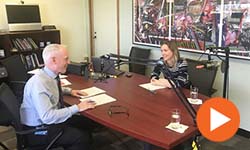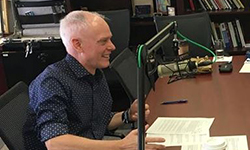
Global Affairs Canada Podcasts – GAC Files
Discover the GAC Files! Intended for Global Affairs Canada (GAC) employees and the general public, this podcast series focuses on the people, challenges and ideas at the heart of the department’s business.
Connect and listen to the episodes on your favourite platform:
This website contains works that are protected by the copyright of Global Affairs Canada. The Copyright Act grants a number of exclusive rights to authors of original works, such as the exclusive right to reproduce their works or to communicate them to the public. In order to protect the information contained in the works, the material on this website may not be published elsewhere than on this website and its selected distribution platforms.
The GAC Files episodes
Episode 57: Indigenous perspectives on Reconciliation
As GAC advances on the path to reconciliation, we understand better the depth of the challenges that Indigenous employees may face. Join our host, Jenna Hendrix-Miljours, as she performs a traditional smudging ceremony to cleanse the space before welcoming her guests, Robert Beamish and Brenda Wills. Listen to their stories and hear about Global Affairs Canada initiatives such as the Indigenous Peoples Network.
December 7, 2023
Transcript - Episode 57: Indigenous perspectives on Reconciliation
Robert Beamish: I think that as we look at reconciliation, it's really important that we allow ourselves to have that grace and realize that we're learners; that it's not about one course, and then we've got reconciliation sorted and understood. It's an ongoing journey that requires practice because like a language, if you don't use it, you're going to lose it.
Narrator: Welcome to the GAC Files, a podcast about the people, issues and ideas driving Global Affairs Canada.
All is quiet in the studio. Braided sweetgrass, dried tobacco, goose feather and an offering collected in a red pouch are placed on a piece of handmade Indigenous pottery. Cedar oil perfumes the air. These items are used to purify the space before the recording session. Jenna Hendrix-Miljours and Robert Beamish are about to begin their virtual discussion with Brenda Wills, who is at the mission in Singapore. The episode called “Indigenous perspectives on Reconciliation” presents the stories of 3 employees from Indigenous communities. Together, they speak of their career paths and share personal stories. Through their experiences as members of the department’s Indigenous Peoples Network, they discuss reconciliation efforts for listeners at home and abroad.
Jenna Hendrix-Miljours: Aaniin boozhoo. Welcome, friends, colleagues, listeners. Thank you so much for joining us for this very special episode to discuss Indigenous perspectives on advancing reconciliation at Global Affairs Canada. My name is Jenna Hendrix-Miljours, and I will be your host today. I am currently the Deputy Director of Operations in the Sub-Saharan Africa Branch here at Global Affairs Canada, also known as G-A-C, GAC. I am delighted to be joined by 2 fellow Indigenous colleagues today.
With me are Robert Beamish, Policy Adviser with GAC's Transformation Team, and he is also co-chair of the Indigenous Peoples Network at the department. We are also joined by Brenda Wills, Counsellor and Senior Trade Commissioner at the High Commission of Canada in Singapore. Brenda is also an active member of the Indigenous Peoples Network, as I am. I'm thrilled to have the opportunity to be here with you both, to hear your views, your perspectives, your thoughts, and for us to share about our experiences with listeners in Canada and around the globe.
(Musical transition)
Before going further, I would, of course, like to take a moment for us to ground ourselves an acknowledgment and recognition that the lands on which we are gathered are part of the traditional unceded territory of the Anishinaabeg Algonquin people. We take this moment to honour all First Nations, Inuit and Métis peoples who are here, who have always been here and who are still here today. I also invite all listeners to not only reflect upon the land from which you are joining us, but to actively get to know its story to the present day.
I am a descendant of a proud and noble people and member of the Matachewan First Nation, which is part of Treaty #9. I joined Canada's public service in 2008, and I am also a very proud member of Canada's foreign service. I have worked as an international development officer and senior analyst in education. I've been on posting abroad at Canada's High Commission in Barbados and, most recently, worked with the Anti-racism Secretariat at GAC. Now, Robert, I would like to turn to you now to introduce yourself.
Robert Beamish: Thank you very much, Jenna. More to me, my spirit name is Ozawa Makua, which in Ojibwe means “Brown Bear,” and that the teachings of the bear guide me in a lot of what I do; and in a lot of those teachings the bear is the protector. But the bear is also one that we seek after to learn about medicine. The bear is also a healer, and so, I remember those 2 things as we engage with the department, as we go about our lives, both as public servants and as Indigenous Peoples here at Global Affairs Canada. And, as I get to bring forward my intersections, from my mother, who immigrated from Jamaica, and my father, who's Algonquin, Métis and Irish. And so, I get to bring those intersections into what I do here at the department, how I live and to the space that we've created within the Indigenous Peoples Network. So, thank you both for filling that space and filling this space. Miigwech.
Jenna Hendrix-Miljours: Thank you so much, Robert. I love when you share the story and the meaning behind you're—the name that you received as well. I remember when I first met you, and I just think back to that time 3 years ago and how—what your journey has also been since then. So, thank you for sharing. Brenda, over to you please, to introduce yourself.
Brenda Wills: Thank you, Jenna, for hosting and for the invitation to participate. To introduce a little bit about myself, I'm a Red River Métis originally from southeastern Manitoba, but I also lived in northern Manitoba as a child and in Winnipeg while I studied at the University of Manitoba. So, I like to say I'm from Manitoba and currently a long way from home in Singapore, working as senior trade commissioner. I joined the foreign service in 2004, and I'd like to share a little bit about what it was like to first move to Ottawa because the difference in demographics really did strike me. Specifically, I didn't see many Indigenous people.
Well, Indigenous Peoples make up approximately 5% of the overall Canadian population. In Manitoba, it's 18%, and, in Winnipeg, it's approximately 12, 12.5%. And by contrast, in the Ottawa-Gatineau area, the Indigenous population is 3%. So, I can understand why it didn't look so familiar when I arrived in Ottawa as such a young foreign service officer. And I also don't recall meeting another Indigenous colleague during the first 16 years of my career. My first recollection was when I became involved with the Indigenous Peoples Network in 2020. And, I've had an interesting career so far, one that I'm very proud of, but I'm not sure I would have ever thought to pursue it had it not been for an assignment that my father accepted abroad with the hydro utility in Manitoba. I just wasn't exposed to the possibility when I was at Manitoba until that time.
And, you know, to underscore the importance of role models, it was really through an interaction with the ambassador to Ireland in Lesotho, Africa, where we were living. I thought he had the most incredible job such that it motivated me to find out how to join the foreign service. And had that not happened, I very much doubt that I would be here today. I've had the privilege of representing Canada through postings to 5 countries so far: the United States, Chile, Colombia, Mexico, and, now, Singapore. And, I've had a number of interesting positions at Global Affairs Canada Headquarters, including chief of staff to Canada's chief trade commissioner and 2 stints working in trade policy.
Jenna Hendrix-Miljours: Thank you so much for sharing about this. So, a few weeks ago I attended the event on Parliament Hill for the National Day for Truth and Reconciliation and Her Excellency the Right Honourable Mary Simon, the Governor General, spoke, and there are several of her words that I really did carry with me that day around reconciliation. And I just wanted us to—I just wanted to bring those words back into this space as we move forward into the rest of our conversation.
***
Audio clip of Her Excellency, the Right Honourable Mary Simon, Governor General of Canada: Reconciliation is hope, hope that we are building together a future that is free from racism, harm, prejudices, exclusion and violence and injustices.
***
Jenna Hendrix-Miljours: So, what I've taken away from what she shared that day is that reconciliation is a complex issue. Reconciliation is also about how we interact with one another, how we show respect, and, also, how we get rid of racism. It means equality in the country for all, especially Indigenous people, who have suffered immeasurably without the type of services that we in other parts of the country take for granted. And reconciliation is also hope.
Narrator: For Jenna, Robert and Brenda, the Indigenous Peoples Network at Global Affairs Canada represents community spirit. It’s a space where they can share their views on reconciliation while explaining the changes, challenges and opportunities they face as Indigenous employees.
Robert Beamish: When I started with GAC [Global Affairs Canada], I was looking for an opportunity to connect with other Indigenous employees, but it was really hard. The network was engaged in so many corporate initiatives. But there was no time for employees to connect, get together, share the culture, build a community amongst themselves. And I saw that as my goal for the Indigenous Peoples Network. And I shared that goal and vision with the other co-chair, Rebecca Deatcher, and we found it challenging to strike a balance between our corporate priorities and our goal of having a space for ourselves, just having, just being, just being there, with no expectations of holding consultations or providing advice for land acknowledgements, but just being. There are many challenges, but also opportunities, and to be engaged in those opportunities and those challenges with Indigenous and non-Indigenous employees. And that’s my vision for the network, to share knowledge for the entire department, to be engaged in reconciliation.
Jenna Hendrix-Miljours: Thank you, Robert. Brenda, I also wanted to give you an opportunity or ask you if you also wanted to share a bit about your experience with the network over the past few years?
Brenda Wills: Yes, good job. Thank you, Robert and Rebecca. The network has also developed significantly in recent years largely because of their leadership, charisma and dedication. I’m very proud to be a member of the network, and there’s a strong sense of belonging to the community, which is really beneficial for all of us. It helps Indigenous employees to network, to feel a greater sense of belonging, to help us navigate within the department, and to receive advice and to grow professionally. And as the community continues to grow, more voices contribute to the ideas and suggestions by the network to senior management. Which is, of course, very good and beneficial for our collective reconciliation efforts.
(Musical transition)
Jenna Hendrix-Miljours: The Indigenous People Network, as we refer to as the IPN as well, is a key stakeholder in the department. And, clearly, a key contributor in supporting the development, the implementation of GAC's action plan to advance reconciliation with Indigenous Peoples. Now, Robert, as co-chair of the IPN, you were highly engaged in this process, so I would like us to talk a little bit about the action plan in the department. What are some key goals of the plan and highlights or progress toward reconciliation that you view as significant? And what are some ongoing challenges and opportunities for GAC?
Robert Beamish: I love this question, Jenna. I do. So, there are 6 goals in Global Affairs Canada's Action Plan on Reconciliation with Indigenous Peoples. So, across these 6 goals, it looks at ways that—I think of the “how” we do our business, the culture that we have here at Global Affairs, also the “what” we do. So, looking at, you know, our development programs, our trade programs, how and what we're doing as it relates to trade policy. So, these areas are affected by the action plan. But where I spend a lot of my time are on the first 2 goals.
So, the first goal is to make Global Affairs Canada an inclusive and supportive space for Indigenous Peoples. Now that is a big undertaking because I think that there's also a huge opportunity. Under that goal, the actions that are articulated speak mostly to representation, you know, having representation at all levels within the department, having Indigenous people present and active in the department and, when I also think of that, I also think that it's more than to have an Indigenous person present than for that to be a safe space for Indigenous Peoples. I think some of the areas that really speak to further making this space safe for Indigenous people is the safety to self-identify and not have an expectation of learning, or that now we have someone that can lead our land acknowledgments at the start of meetings—that their views, worldviews are respected and understood.
So, how do we make a space safe for Indigenous Peoples within that? So there's actions that the department has articulated that relate to representation, that relate to promoting reconciliation at all levels—that this isn't just something that's done by team leaders or by employees who are Indigenous, but it's done at every level of leadership across the department; and, also, what we can do as individuals to have that knowledge ourselves so that when we engage with Indigenous Peoples, we're going beyond tropes or stereotypes, and we can have a meaningful conversation that is reflective of experiences, and that we can go in with curiosity and understanding. And that takes some effort on our own parts as individuals.
And I think that takes us to the second goal that is really important to me, which is to increase the knowledge and understanding of the rights, histories, heritage, cultures and diverse perspectives of First Nations, Inuit and Métis peoples and the importance of advancing reconciliation. I think we know that reconciliation is important, but how do we articulate why? Is it just because there were atrocities? Is it just because there was cultural genocide? What is the importance? Why is this so important? And I think if people don't understand that and internalize it—and, also, it's that space to ask questions because if you don't understand something, and you can't ask that question, then you're never going to get to that next step of really internalizing what's there and realizing that this is important beyond just the bad things that have happened. But this is also our way forward.
And so, those are the 2 goals that really speak to me because I think they inform everything else.
Jenna Hendrix-Miljours: There are so many examples of initiatives that are happening within the department, and one that I would like to briefly mention is the one initiative that we know is helping to support and advance reconciliation. And it's so near and dear to our heart as well—even though I'm not at all part of it. But it is the Indigenous Professional Experience Program, the IPAP, which was created, and the idea was conceived, by former ambassador Deborah Chatsis, who is no longer with us, but she is a First Nations woman. So, we know that her carrying her identity as the ambassador of Canada to Guatemala definitely translated into her work and her perspectives and her ways of doing business, and in the sense of the business of our department. So, as I've talked about Deborah Chatsis, this also brings up the importance of—or the reason why representation matters. So, Brenda, would you have any thoughts on this?
Brenda Wills: I think it's important for us to continue to try to get more Indigenous employees into the department and then to help bring people into higher levels through training, through mentoring, through sponsorship. And so, the Deputy Ministers’ Pilot Sponsorship Program is a great example. And that was something unique that Global Affairs Canada developed. And so, I'm very proud to be part of the first cohort and I—you know, there were a number of us, of Indigenous people, and I'm excited to see it replicated.
And we can look we can look at what just happened recently in Manitoba with the new premier, the first First Nations premier. And that's that's really set some ripples and some excitement, particularly among Indigenous youth. And and now people have someone to look up to to say, hey, wow, that that person has reached the highest of of that government in the province.
Jenna Hendrix-Miljours: Thank you so much, Brenda, for these reflections and, also, for sharing your experience. You're right: the Deputy Ministers’ Pilot Sponsorship Program was a key initiative as part of GAC’s, or Global Affairs Canada's, Anti-racism Strategy, which was also launched in 2021, the same year that the action plan to advance reconciliation with Indigenous Peoples was launched. And while the anti-racism and reconciliation are distinct experiences and objectives, in a way, they certainly complement each other in what we are trying to do in terms of making the department even more equitable and even more inclusive, safer for all employees and Indigenous employees and Indigenous Peoples in general in terms of the work that we do.
Narrator: According to Brenda, learning opportunities and training are crucial to advancing reconciliation. She also suggests a few ideas for the department’s employees.
Brenda Wills: One suggestion to improve the current training would be to include a greater number of diverse perspectives. For example, I recently took a very useful and informative course, but the facilitator clearly stated that she was speaking only from a First Nations perspective. Wouldn’t it be great to also include Métis and Inuit facilitators? I imagine that our colleagues are curious about the various First Nations, Métis and Inuit perspectives, cultures, histories and traditions. I think that new foreign service officers are required as part of their onboarding to take a course on reconciliation with Indigenous Peoples and the role of Global Affairs Canada. It would be a good idea to make other courses and training mandatory to help develop an even deeper understanding. So that our foreign service is fully prepared to talk about the interests of Canada’s Indigenous Peoples and advance those interests.
Narrator: It’s interesting to hear the Indigenous perspectives of our guests. Before concluding this episode, Jenna invites us to reflect on the ways that we can increase our knowledge and understanding of Indigenous Peoples in our professional and personal lives. To learn more, we invite you to read Global Affairs Canada’s Action Plan on Reconciliation with Indigenous Peoples, available on the international.gc.ca website.
Robert Beamish: I want to leave with some words of encouragement, but also an analogy that has really helped me and helped others to understand reconciliation and the steps that it takes to meaningfully take on reconciliation—and, I think, comparing reconciliation and the learning that comes with it to the learning of a new language. And I think that as we look at reconciliation, it's really important that we allow ourselves to have that grace and realize that we're learners; that it's not about one course, and then we've got reconciliation sorted and understood. It's an ongoing journey that requires practice because like a language, if you don't use it, you're going to lose it. And I think that that's the piece that I would like to encourage folks on with this—to see this new language and this learning journey as something that we take on as lifelong learners, not as something that we just do once and then we've got it. But it's going to take a while, but we're all here for it.
Brenda Wills: Robert, I love that analogy. I have inspiration from former senator Murray Sinclair—and that, you know, for people that don't know where to start on your learning journey, as you're understanding more, learning more, think about where you think you can contribute and how you think you can contribute.
You don't have to take on every issue or try to contribute in every way. Find an area that you're comfortable with, or most comfortable with, and find a way to contribute and be engaged. And don't be afraid to say the wrong thing, to do the wrong thing. The expression of interest and the fact that you're trying will be appreciated.
Jenna Hendrix-Miljours: Absolutely. All these words resonate with me as well. I also love that analogy, Robert, and all of this gives me hope. This conversation today, this space today, exists because there is commitment and there really is recognition of the need to advance on reconciliation at Global Affairs Canada.
So, to our listeners, please share, please carry this with you and please participate in reconciliation in the ways that feel right for you, where you are on your journey, even if for now that means perhaps attending for the first time a powwow next summer, for example.
Thank you so much for your presence today and for everything that you have shared. I know that there is so much more that we could have gotten more into depth on, that we could have talked about between the 3 of us with all our life experiences, as well as our experiences working at Global Affairs Canada. I know that we could certainly continue to discuss this for many hours together over perhaps some bannock and tea, maybe some blueberry jam as well. To all our First Nations, Métis, Inuit, mixed identities kin, who are tuning in, we feel you, we know you are here and that we will all continue to be here. Miigwech, everyone, banapii.
Narrator: The use of audio clip from this episode is courtesy of APTN.
The GAC Files is a production of Global Affairs Canada. All the opinions expressed in this podcast are those of the individuals and not necessarily those of Global Affairs Canada. For more information on Global Affairs Canada podcasts, visit www.international.gc.ca. Be sure to subscribe to our podcast and thank you for listening to the GAC Files.
Miniseries on Sustainable Development Goals
Episode 1: Climate Action and Sustainable Development Goals with Tom Bui
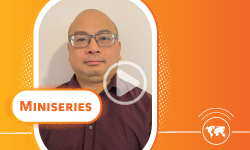
February 3, 2023 - 11:39 min.
Transcript – Download
A little more than 2 years ago, Tom Bui took on the role of Director of Environment, but his journey at Global Affairs Canada dates back to 2009. After 25 years as a public servant, he has left his mark as a leader and negotiator at Department of Finance Canada and Immigration, Refugees and Citizenship Canada. Tom’s vast expertise is partly based on his past role as adviser at the World Bank Group and his current membership on both the Global Environment Facility Council and the Green Climate Fund Board.
Alexandre Lévêque, Assistant Deputy Minister of Strategic Policy at Global Affairs Canada, talks with Tom Bui about climate action and the Sustainable Development Goals.
Episode 2: Challenges of the Sustainable Development Goals in Africa with Caroline Delany
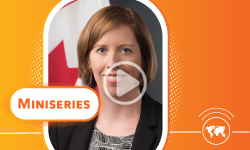
February 3, 2023 - 13:18 min.
Transcript – Download
Since joining what was then the Canadian International Development Agency in 2005, Caroline Delany has held many roles in international development and foreign policy, particularly in her postings to South Asia and Africa. She was Canada’s High Commissioner in Mozambique and director of the Mozambique Development Program, which contributed greatly to her knowledge of international affairs. Her perspicacity has allowed Caroline to lead Global Affairs Canada’s engagement in many programs and policies, including the Feminist International Assistance Policy.
Alexandre Lévêque, Assistant Deputy Minister of Strategic Policy at Global Affairs Canada, talks with Caroline Delany about the Sustainable Development Goals in Africa and their performance measurement.
Episode 3: Trade and the Sustainable Development Goals in Brazil with Heather Cameron
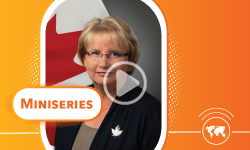
February 3, 2023 - 11:07 min.
Transcript – Download
Since joining Global Affairs Canada in the 1990s, Heather Cameron has made major contributions to international development during various assignments overseas. Heather has served in the field of regional humanitarian affairs in Zimbabwe, and been director of development in Mozambique and high commissioner in Ghana. She is currently consul general in São Paulo, Brazil. Her extensive experience has helped her and her team deliver high-quality service to Canadian clients and partners, advancing Canada’s trade and policy priorities.
Alexandre Lévêque, Assistant Deputy Minister of Strategic Policy at Global Affairs Canada, talks with Heather Cameron about Brazil’s engagement with the Sustainable Development Goals and how Canada-Brazil trade has supported achieving them.
Miniseries on Sustainable Development Goals – All 3 episodes without interruption
February 7, 2023
Transcript – Miniseries on Sustainable Development Goals – All 3 episodes without interruption
Alexandre Lévêque: More than 2 years ago, Tom Bui began his nature journey at the Global Issues and Development Branch at Global Affairs Canada. Currently the department’s Director of Environment, he is proud to be a member of both the Global Environment Facility council and the Green Climate Fund board.
Recognized by his peers as a great leader and negotiator, Tom has been a loyal public servant for the past 25 years. In addition to Global Affairs Canada, he has left his mark at Finance Canada; Immigration, Refugees and Citizenship Canada; and as a finance counsellor at the World Bank Group, an organization that provides a wide array of products and services to countries in need around the world.
Hello, dear listeners. This is Alexandre Lévêque, Assistant Deputy Minister of Strategic Policy at Global Affairs Canada. Welcome to this miniseries on the Sustainable Development Goals (SDGs), in which I’ll have the pleasure to discuss with Tom Bui sustainable development and the fight against climate change
Tom, welcome to the podcast.
Tom Bui: Thank you very much, Alexandre. It’s a pleasure to be speaking with you today.
Alexandre Lévêque: Before we begin, I would like to point out that this episode is part of a 3-part podcast miniseries on the SDGs.
To respect Canada’s Official Languages Act, I invite our guest to speak in the language of his choice.
Tom, let’s get into it. I’ve been told that you’re a bit of a storyteller, I find you have a fascinating journey and I’d love for you to share with our listeners a little bit of your story. You were born in Vietnam, came to Canada as a refugee. Tell us a little bit the story of Tom and, and how you got to where you are today.
Tom Bui: Thank you, Alexandre. Yes, it’s true. I grew up in Vietnam. My mother, and my 2 brothers and their families are still in Vietnam. I was a refugee. I am still a refugee. I lived in the refugee camp in Palawan, Philippines, for 2 years.
And once you have gone through an experience like that, it changes you. And so, my journey in life has always been about purpose to be there for people. So I took jobs, for example, out of SFU. I chose the public service instead of Wells Fargo. And that…. I chose the World Bank Group. Then I chose to become the Director for Refugees, or the Refugee Director, at Immigration. And then I was there for Africa. I was there for a lot of people who are voiceless and vulnerable.
And 2 years ago I needed a new position. My friend told me to apply for the position of Director of Environment to become a board member of the Green Climate Fund. Fortunately, she committed to providing me with strategic advice to actually do well as the Director of Environment to fight the climate crisis, but more importantly I would say to protect the only home we have. There’s no Planet B, as Ban Ki-moon said.
Alexandre Lévêque: So that’s a great segue. Tell us what your role is as Director for the Environment Division at Global Affairs.
Tom Bui: I put it down as 3 things. One, all of my specialists actually serve the 3 ministers. They review all development projects. They review all MCs and all TB submissions. They actually look at all new strategies from an environmental integration lens. I have a team that delivers the oceans portfolio: we fight plastic pollution. We also are taking care of the policy suite for environment, climate and now, nature.
Alexandre Lévêque: And for our listeners, “TB sub” is government speak for “Treasury Board submission,” a very important document and part of the process to get the green light to how we’re going to spend the funds.
Tom, why is climate action an important area for Canada and for Global Affairs Canada?
Tom Bui: Climate change is a very, very interesting subject in that it actually can be called an existential crisis. It touches everyone in Canada and around the world. I grew up in B.C. and just, you know, last year there were forest fires and there was a heat wave, a heat dome that killed lots and lots of life.
Personally, my mom, still in Vietnam, cannot go out because of the higher temperatures. The higher temperatures actually would kill her. And that’s why her doctor told her that she can only go out of her house during the night.
Alexandre Lévêque: That’s where we see how it touches people very personally. This is not just a policy file, right? It touches everyone across the planet. How can Canadians contribute to reaching climate action goal?
Tom Bui: You cannot reduce poverty without protecting the health of the planet because quite a lot of food comes from forests, comes from our coastal waters, and so on. Everybody depends on it.
When it comes to Canada and Canadians, what can we do? Canadians have already adopted quite a lot of measures, for example. We are transitioning toward electric vehicles. We are committed to do energy transition. At the city level, quite a lot of buses are actually now electric. And if we can do other things like, for example, use less, recycle more, then the cost of production of the goods and services that we need goes down. And the cost of production actually includes energy that is actually the source of quite a lot of the climate change problems that we have.
Alexandre Lévêque: Can you tell us a little bit about concrete actions, like what kind of actions as Director of the Division you’re in charge of? A couple of examples of concrete actions you’ve actually taken to move the needle a little.
Tom Bui: Concretely, last December, the Prime Minister announced $350 million in new funding for nature conservation around the world to fight climate change, to protect nature in order for nature, biodiversity, food to be there for our generation and generations to come.
In terms of my own decisions as Director of Environment, I, for example, sit on the board of the Green Climate Fund. I approved investments in India to allow for electric, clean mobility solutions, basically cars, buses that run cleanly. Because air pollution, the use of fossil fuels, actually not only hurts the planet, but harms our health.
And the other concrete thing that I did was to approve investments to restore coral reefs. We all know coral reefs are not only the source of food but, they’re a barrier against disasters and bad weather that impact coastal communities.
Alexandre Lévêque: Tom, is there hope for the future? Is there hope on climate change? What makes you an optimist?
Tom Bui: When I see Greta Thunberg, a teen who fights for her generation and for generations to come, that gives me hope. And I see that people who [have] not devoted, like, decades to climate coming on board in order to contribute what they can to fight this existential crisis for themselves and for their families, for their communities and for all people, that gives me hope. It’s actually the commitment of everyone.
Alexandre Lévêque: Great words to finish on. Tom, thank you for joining us today. It’s a real pleasure to talk with you.
Tom Bui: Thank you, Alexandre.
Alexandre Lévêque: Caroline Delany is very well versed in international affairs. Since she joined what was then the Canadian International Development Agency in 2005, Caroline has held many roles in international development and foreign policy, particularly in South Asia and Africa. She was Canada’s high commissioner to Mozambique as well as director of the Mozambique development program. She has led Global Affairs Canada’s engagement in many development programs and policies, such as the Feminist International Assistance Policy.
Hello dear listeners, this is Alexandre Lévêque, Assistant Deputy Minister of Strategic Policy at Global Affairs Canada. Welcome to this miniseries on the Sustainable Development Goals (SDGs). In this episode, Caroline Delany and I will discuss the challenges associated with the SDGs in Africa. So, again, welcome.
Welcome, Caroline.
Caroline Delany: Thank you very much.
Alexandre Lévêque: Before we begin, I would like to point out that this episode is part of a 3-part podcast miniseries on the SDGs. In accordance with Canada’s Official Languages Act, guests are free to speak in their language of choice. So, if you’re ready, let’s get started.
Caroline, you’re just back from a number of years based in Maputo in Mozambique, where you were high commissioner. And for our listeners, “high commissioner” and “ambassador” are 2 synonymous titles. High commissioner simply means that you’re posted in a Commonwealth country. And, actually, Caroline and I have this in common because I was once high commissioner to Tanzania, which is right next door to Mozambique. Caroline, tell me a little bit about how you viewed and understood your role as high commissioner.
Caroline Delany: Thanks, Alexandre. It’s nice to meet someone who has a similar experience with regard to explaining that particular title. And the other thing that was unique about my time there was that I was also director of the development program, which I think is one of the only positions left in the department that is still head of mission and development director. So it was a really excellent opportunity for me to be able to drive integration across all of our lines of efforts in our engagement in Mozambique as well as the other 2 countries that I covered, which were Malawi and Eswatini. Some of my favourite times there were really related to the field visits. I think some of my strongest memories are related to meeting women’s rights organizations who declared themselves feminists all over Mozambique and Malawi and Eswatini and really moved to mobilize support, whether it was for shelter to women experiencing violence at home or to respond to the risks to young people in the face of climate disasters. It was those relationships that I was able to build and the things that I was able to learn from the Mozambicans, Malawians and Emaswati, who were working so hard to build a better future for their country. So that’s really what I remember about my time there.
Alexandre Lévêque: And I have to say, what you mentioned actually brings back great memories for me in my time in East Africa because what you mentioned really echoes my time there and some of my favourite experiences were also field visits. And you mentioned feminism: this was a big theme when I was posted to Tanzania, as well. Caroline, you are currently the Director General, Southern and Eastern Africa Bureau, at headquarters. Could you tell us a little bit about the role of the SDGs in the countries in your region?
Caroline Delany: Thank you. That’s a good question, but it’s also a little difficult. Clear objectives, as defined in the SDGs, are essential to focus our collective business on the work that will make it possible to reduce poverty. And nowhere is this more important than on the African continent, where extreme poverty has increased during the COVID pandemic. Despite this, much progress has been made on the continent in recent decades, and there is cause for optimism looking ahead. One study suggests that 14.1 million lives have been saved in Africa as a result of the SDGs’ focus on issues such as child mortality, maternal mortality and AIDS. In the African context, I also think that the SDGs’ recognition of the fact that all countries have work to do to address the drivers of poverty is an important step towards international approaches that truly recognize that we are all partners in this.
Alexandre Lévêque: Thank you, Caroline. I am well aware that when you’re dealing with development issues, it’s not always easy. As the former High Commissioner of Canada to Mozambique, tell us a little bit about the challenges the countries in your region - what are some of the challenges you faced or were confronted with in implementing the SDGs?
Caroline Delany: A key challenge for the SDGs is that engagement toward and awareness of the SDGs remain limited in the day-to-day development work on the ground. While useful at the global level, they don’t always frame the work how governments, people and implementing partners understand it. This is not to say that there’s not value in the goals. One of the most important outcomes of the MDGs and the SDGs is the importance of data and even our ability to talk about the challenges to meeting the SDGs is because of the data and the data systems that both the MDGs and the SDGs have driven in developing countries.
Alexandre Lévêque: Thank you very much, Caroline. And for our listeners: a reminder that MDGs refers to the Millennium Development Goals, which preceded the Sustainable Development Goals. Music to my ears as the chief data officer for the department: I love to hear when data can be put to good use. Any other successes that involve Canada and your countries of accreditation in the implementation of the SDGs?
Caroline Delany: I think, of course, for us, in terms of the Feminist International Assistance Policy, gender equality is always front [of] mind and a major priority in Canada’s engagement overseas. And I certainly felt that in Mozambique. And the focus on gender equality and the SDGs I really think is a driving factor around continued attention to the particular challenges that women and girls face in terms of realizing their full potential. I think one of the most profound experiences that I had while I was on posting was meeting young mentors. These are young women who mentor other girls younger than them who are at risk of child marriage. In Mozambique, they call it premature unions, which I think is also a useful way of recognizing these are not consensual relationships, these are not marriages but, but forced unions between children and adults. And these mentors play an incredible role and a very profound role in terms of supporting the girls to avoid these circumstances, to have those difficult conversations with their family members or with others that can support them to avoid those particular pitfalls. And I really think that’s a big memory for me: the strength of those mentors and the difficult work that they have in supporting the girls in their communities.
Alexandre Lévêque: Now, in the past, we’ll say [a] year, year and a half, maybe even going back 2, 3 years, given the number of crises…the layered crises that started with the pandemic, a lot of analysis, a lot of publications have started talking about the fact that the SDGs are now off track. Obtaining them, the amount of resources that are required to achieve them are not tracking the need and in this context of what we now call “pluri-crises,” it seems like they’ve become less and less attainable. Based on your experience, are they attainable? And are there some key actions that Canada can take to help increase the momentum and actually meet the SDGs by 2030?
Caroline Delany: I personally believe the SDGs remain very relevant because they are an expression of global objectives with regard to development and they are tools to be able to track progress toward really important objectives. At the same time, I think that it’s important to recognize that in the African context in particular, we’re not on track to meet the targets for 2030. And, in fact, target number 1 in terms of the reduction of extreme poverty looks incredibly and almost impossible to meet before 2030. And so part of the discussion around the SDGs is to recognize their limitations that exist already. For Canada, I think it really does mean just doubling down on what we already know is essential for development and I would offer that in the African context: this means recognizing African leadership and expertise. There is a set of African objectives as well: it’s called Agenda 2063. These are longer-term objectives and they’re very much driven by the members of the African Union. They can inform our understanding of the SDGs and what’s needed to move forward on those over the next, well, I guess, 8 years now.
Alexandre Lévêque: Caroline, I’d like to finish on a bit of a hopeful note. I received Ambassador Rae, Bob Rae, our Ambassador to the UN, at the same microphone recently. We also finished on a bit of his hopes for the future. Canada has played an important leadership role on climate change, on biodiversity. Not so long ago, the Conference of Parties, COP15, was hosted in Montréal on biodiversity. I’m curious to know: What are your hopes particularly with regard to the climate action goal? Could you provide a couple of words with regard to specifically the climate action goal?
Caroline Delany: I do think there’s reason to be optimistic because I really think that we’ve seen the world turn a corner when it comes to climate change and climate action. And there’s a level of recognition of the crisis that I don’t think was there. For example, when I landed in Mozambique in 2018, it really felt that Mozambicans’ understanding of the impacts of climate change was much higher than what I had seen in Canada. And I think that that’s changed in the 4 years that I have been away. And what I hope is that this turns into concrete, rapid and flexible tools to support the countries that have the least responsibility for climate change, but are also the most impacted. The other opportunity that this situation creates is that these new technologies and the tools for climate adaptation and mitigation to address existing gaps that drive persistent poverty are really there, unlike Canada, where we face the very tough work of adapting existing infrastructure. In many African countries, there is the opportunity to build in climate-smart approaches from the very beginning to leapfrog technology, to use some lingo that’s used quite a bit these days, and I do think that that’s particularly exciting.
Alexandre Lévêque: Caroline, thank you very much. It’s been a real pleasure having you today.
Caroline Delany: Thank you very much.
Alexandre Lévêque: Heather Cameron has been making Canada shine abroad since she joined the department in the 1990s. Working in the international development field, she had a number of assignments overseas. During her career, she served in Zimbabwe in Regional Humanitarian Affairs, in Mozambique as Director of Development and in Ghana, as Canada’s high commissioner. Her significant experience has brought her to São Paulo in Brazil, where she and her team deliver services to Canadian clients and partners, advancing Canada’s trade and policy priorities in the southern region of Brazil.
Hello dear listeners, this is Alexandre Lévêque, Assistant Deputy Minister of Strategic Policy at Global Affairs Canada. Welcome to this miniseries on the Sustainable Development Goals (SDGs) with Heather Cameron. Together, we will explore the relationship between trade and the Sustainable Development Goals.
Heather, welcome to the podcast.
Heather Cameron: Thank you. Great to be here.
Alexandre Lévêque: Before we begin, I would like to point out that this episode is part of a 3-part podcast miniseries on the SDGs. To respect Canada’s Official Languages Act, I invite our guest to speak in the language of her choice. Heather, let’s begin. Could you explain for our listeners what exactly is your role as consul general?
Heather Cameron: I’m here based in São Paulo, Brazil, one of the world’s largest cities, to represent and advance Canada’s priorities in the 4 southern states of Brazil. So trade, investment, foreign direct investment attraction, very big parts of the job, but also we have a large responsibility to Canadians in need of consular assistance and other priorities to advance, for example, in the areas of gender equality, environment, etc.
Alexandre Lévêque: Indeed. And many people would be jealous to hear about your experiences living in Brazil. Can you share some of your favourite experiences or anecdotes that really mark your time as consul general?
Heather Cameron: Well, without question: the pandemic, whether it was helping Canadians get home, just helping our staff through that and then thinking through how to innovate and how to serve abroad in a very difficult context in a very urban setting. But so glad things have opened up now and that we’re able to get out and explore this beautiful country a little bit more, and it’s great to welcome back so many Canadians who are here in the areas of education, trade and others and to see how they advance the relationship between Canada and Brazil.
dre Lévêque: Now, as our listeners know, SDGs [Sustainable Development Goals] are universal, they mean different things to different countries; how has the context evolved and how are they relevant in the Brazilian context?
Heather Cameron: Brazil was very engaged actually on the Sustainable Development Goals, including here in the city of São Paulo, the state of São Paulo and other actors. And, in fact, a UN-led organization called the Global Compact, which brings together private sector actors to help advance the SDGs, its largest chapter globally is based here in Brazil. And so there’s quite a broad societal engagement on the SDGs offering lots of inspiration and lots of opportunities to connect.
Alexandre Lévêque: You, in your career, have made some changes or interesting moves that not every foreign service can claim to have done. You were much more of a development expert, and now, I would argue, in São Paulo, the bulk of your work is focused on trade and on helping Canadian companies in Brazil. That’s a pretty significant change in career trajectory. First of all, if you wouldn’t mind taking a minute to walk us through why that change and speak a little bit about how that came about for you?
Heather Cameron: Well, I’m grateful that [the] Canadian foreign service and the public service offers us a chance to serve abroad and to bring different strengths to different jobs. And, of course, development is a social and economic process that all countries are engaged in. Regardless, there’s always room for improvement. And so, the private sector and the role of the private sector, the role of trade, is always a big part of the development process even if in different countries… Canada chooses to target its official development assistance towards a particular vulnerable group or towards a particular issue. Without question, the overall development trajectory in any particular context really requires a strong active private sector and… to create those jobs, to create that wealth. And so perhaps it’s not quite as big a shift from an SDG perspective as it might be seen.
Alexandre Lévêque: So I’m hearing a lot of complementarity. And would you say in a way that your training or your experience as a development officer has helped you, has contributed to you being a better senior trade commissioner, the head trade commissioner in São Paulo?
Heather Cameron: I would say yes, I think it’s helped make a great consul general, especially when we look at priorities like clean tech and responsible business conduct and the opportunities to advance with Canadian technologies on really important things like energy transition. And so being aware, I think, more broadly of the contributions that can be made really helps advance opportunities for Canadian companies within those frameworks.
Alexandre Lévêque: I’d like to circle back a little bit to the SDGs themselves. How does Canada’s inclusive approach to trade contribute to meeting the SDGs in Brazil?
Heather Cameron: I think our inclusive approach to trade, part of it comes through trade policy and the kind of dialogue that we have with different countries about the differential impacts of trade, about norms and standards for trade… and those create opportunities for entrepreneurs. And that’s really important. If I share an example, you know, a small company from southern Ontario that has some amazing wastewater technology that’s now being used by some of the largest public utilities in the world.
And so to see our department encouraging small, medium enterprises to export, to see them having export success in an area that also helps, directly relate to, SDGs such as responsible consumption and production, clean water and sanitation…that really brings a smile to my face and really makes me feel very positive about how Canadian exporters can contribute to the achievement of SDGs, not just here in Brazil, not just in Canada, but around the world.
Alexandre Lévêque : Heather, these are great success stories. Can you also tell us about some of the challenges you face in this job?
Heather Cameron : In large markets, there is always competition, and for us here at the Consulate General, it is important that we offer the best advice to our Canadian exporters. But there is still work to be done to raise awareness in the private sector, to raise public awareness of the potential of the SDGs to advance - through economic growth - our priorities. So there are people who may want to cut corners, who may not want to meet the standards, etc. That's not the way to do it. That's not the way to do business for Canada or for others, and an important request from citizens now is to have products that are well founded on the environmental and social level. So I think we're making progress, but it's important to make progress as quickly as possible.
Alexandre Lévêque : We don't have much time left for this podcast. I would like to end on a positive note. Heather, I’m curious to hear from your point of view are there reasons to be hopeful when it comes to implementing the SDGs?
Heather Cameron: Well I know that there’s a lot of challenges globally. In terms of the future, I’m really excited about what’s happening locally… and so many companies coming in with some great solutions, whether it’s to optimize renewable energy performance, whether it’s to help with food storage or more efficient production of almost anything. There, I think we’re making some progress there. The private sector is having some great roles and great opportunities, and so when I see those successes happening, that’s what gives me energy; that’s what helps keep us motivated and so pleased to be working on behalf of Canadian companies to help advance in these areas and others.
Alexandre Lévêque: Very good words to end on. Heather, thank you so much. It’s been a pleasure talking with you today.
Heather Cameron: Thank you very much.
GAC Files is a production of Global Affairs Canada. All of the opinions expressed in this podcast are those of the individuals and not necessarily that of their employer or Global Affairs Canada. For more information on Global Affairs Canada podcasts, visit www.international.gc.ca Be sure to subscribe to our podcast. Thank you for listening to the GAC Files.
Episode 56: Ambassador Bob Rae talks about the Sustainable Development Goals
The Sustainable Development Goals are the focus of the conversation between Bob Rae, Ambassador and Permanent Representative of Canada to the United Nations in New York, and host Alexandre Lévêque, Assistant Deputy Minister of the Strategic Policy Branch at Global Affairs Canada.
Ambassador Bob Rae introduces us to these goals, explains why they should matter to Canadians and addresses challenges in achieving them.
Stay tuned: a miniseries on some of the 17 goals will follow in 2023.
December 7, 2022
Transcript - Episode 56: Ambassador Bob Rae talks about the Sustainable Development Goals
Bob Rae: Which is really what the SDGs are all about. It’s about building a better life for people and the building blocks that are required for policy-makers to be thinking about as we try to put these things together. And I’ve always tried to connect those experiences with the work that I do here in New York or the work that I do anywhere so that those things are connected.
Welcome to the GAC Files, a podcast about the people, issues and ideas driving Global Affairs Canada.
Alexandre Lévêque: Hello listeners, and welcome to this podcast on Sustainable Development Goals (SDGs) with Ambassador Bob Rae.
I’m Alexandre Lévêque, Assistant Deputy Minister for Strategic Policy at Global Affairs Canada. It is my great pleasure to be your host.
In 2015, in a historic moment of global unity, the United Nations General Assembly launched the Sustainable Development Goals [SDGs]. Over 150 world leaders and a total of 193 countries committed to work toward 17 goals that would make our world a better place.
These goals built on the lessons learned from the Millennium Development Goals, which were established at the beginning of this century and focused on the root causes of poverty, hunger and inequality.
To talk about this important topic, we have a special guest today who needs very little introduction. Bob Rae is Canada’s Ambassador and Permanent Representative to the United Nations in New York. Before his appointment as ambassador in 2020, he wore a great many distinguished hats, most recently, serving as Canada’s special envoy on humanitarian and refugee issues. And, of course, Mr. Rae was premier of Ontario between 1990 and 1995.
Ambassador Rae, a warm welcome to the GAC files.
Bob Rae: Thank you very much. A great pleasure to be with you.
Alexandre Lévêque: Ambassador, in full respect of Canada’s Official Languages Act, I invite you to speak in the language of your choice, but as I know you are a francophile, I am certain that our listeners will be very happy to hear you in both official languages.
Let’s get started, Ambassador. Maybe for the benefit of our listeners, let’s start with the basics. Let’s explain what are the SDGs and, in particular, why should they matter to Canadians?
Bob Rae: Well, the good thing about the SDGs is that they’re not complicated, they’re simple things like ending poverty, fighting inequality, ending conflict and corruption, tackling the climate crisis. Go down the list: they’re a list of common-sense objectives, that you could say, yes, I agree that providing education for everybody is important.
What’s key about them, which makes them a little bit different from the Millennium [Development] Goals, is that they really apply to everybody. This is not a prescription for poor countries only. This actually is a call to action for every country, including Canada. It relates to our own situation. So we’re not talking about let’s make Lagos, Nigeria, more sustainable, it’s about how do we make Toronto and Montréal and all of our cities more sustainable.
And I think this is a key difference that is really quite exciting because it means that we can mobilize Canadians to support these goals and connect them to what they’re doing in their own cities, what they’re doing in their own way of life, wherever they may be living in Canada. And it also allows us to connect very directly with what’s going on in other places so we can talk and compare and chat with people around the world saying, “How are you doing on this particular goal? How are we doing in this area?”
And I think it’s a really key exercise in 2 things. One is it’s an exercise in solidarity, which is critically important in the world today. It’s something that’s missing in a lot of our discussions. And the second is, as boring as it may sound, it’s a very important exercise in measurement because unless we can measure things, we can’t actually know how we’re doing.
So when we say, “How are we doing?” it’s really important that we start to measure. And that means not just national governments, it means companies, it means cities, it means civil society organizations, it means provinces. And it means every segment of our society can start to have a sense of “How are we doing?” And, Alexandre, you and I know that, in our own lives, we have a simple . . . I’ve said this in the UN. It caused a bit of surprise. I said the simplest measurement I have is that I get on a scale every morning and sometimes the news is good, sometimes the news is bad. But at least I know relatively speaking how I’m doing.
A great philosopher said the unexamined life is not worth living. We have to be constantly assessing “How are we doing?” How are we doing? And this is the temperature, taking the temperature of the world, measuring the world, doing all that all the time.
Alexandre Lévêque: You raise an absolutely crucial question, which is the one of measurement. How are we doing with the SDGs?
Bob Rae: Well, we’re falling behind, which is no surprise because I think it’s important that there’s another sort of feature of common sense is when we’re facing a recession, people get sicker. When the countries are in poverty, the other measurements start to fall back. When the countries are in conflict, measures fall way, way back.
So when you consider how much conflict there’s been in the world and how much conflict there is in the world, it’s inevitable that the SDGs are going to be facing trouble. When we take the world’s temperature, we say, well, conflict has gone way up. Inflation is going up. Unemployment in many parts of the world is going up. So we’ve had COVID. We’ve had all these crises. All these crises have had a dramatic effect on the SDGs. There’s no surprise there, but it’s really important that we keep looking at this question of how we’re doing and then the question of, well, how do we get back on track? And that, I think, is an equally fundamental question for the global community.
Alexandre Lévêque: Several observers, Ambassador, have alluded to precisely what you are talking about—the impact that COVID has had, the impact of multiple, cumulative crises. Some have even called it a “derailment” of the SDGs. Is there a particular role that Canada can play to help put the SDGs back on the rails?
Bob Rae: Yes, certainly. The Prime Minister was appointed Co-Chair of a committee of advisors to the Secretary General along with Mia Mottley, the Prime Minister of Barbados, and it will be an opportunity for Canada. First, to speak with the heads of state of all the countries in the world. With the current reality we are facing, the SDGs are not in good shape, but that is not surprising. It is an inevitable consequence of all the conflicts we have had. This is the time to ask ourselves what we have to do to really try to get ourselves back on track, because we are now in a very difficult global situation. First, climate change is a negative force in terms of sustainable development, and we can see the evidence of that everywhere. A pandemic like COVID-19 requires a collective response, because it is a global crisis. The pandemic is not over in Canada, nor is it over in the United States, where we both live, but regardless, we know very well that if it continues to exist in China or Africa or elsewhere, it will continue to be a pandemic. And so, it requires a global response.
And the conflict in Ukraine, Russia’s aggression against Ukraine, it has had so many consequences—the inflation, the energy problems and the food production problems. So, we do have quite a few problems to deal with. That means we must work together to keep these issues on the table.
But also, the Prime Minister can ask the provincial premiers: how are we doing? How are things going in Canada? And it is so important for us to measure exactly where we are, and that requires a different response, frankly, even from the Canadian government across all government departments. In a budget, we should have sufficiently credible numbers to be able to tell ourselves, here is where we are on the issue of poverty in Canada. Here is where we are on the issue of inequalities. Here is where we are on the issue of gender equality. For all of these examples, these are numbers that are important, not only for the world as a whole, but also for Canada and Canadians.
Alexandre Lévêque: You mentioned the Prime Minister’s role in being an SDG advocate. I’d like to invite you and our listeners to listen to a short segment of the clip the PM recorded for the SDG Moment at the UN General Assembly in September 2022, and I’ll follow up with a question on that.
Prime Minister Justin Trudeau (audio from pre-recorded video presentation): After decades of declining poverty rates, there are as many people living in poverty today as there were in 2015, when the 2030 Agenda was adopted. The truth is that everything from COVID to climate change to international conflict makes the solutions we need more complex and interconnected than ever. But that isn’t a reason to lessen our ambition, it’s a reason to accelerate our efforts toward reaching our Sustainable Development Goals.
Alexandre Lévêque: There’s the word: interconnected. Ambassador, can you explain how the SDGs are interconnected, first of all, to one another, but also, going back to what you were saying at the beginning, in how they are connected to what we are trying to achieve domestically, keeping in mind that the SDGs are not just targets for developing countries, but that every country in the world aims to implement them?
Bob Rae: For a long time, our economic model was based on one simple premise: that the job of the economy is to produce wealth, to produce work and jobs, obviously, but that that’s the central function of the economy.
Over many decades, indeed hundreds of years, you’ve also got to recognize that if the way in which we produce wealth makes people sick, one of my favorite statistics is to talk to people about, you know what was the most important invention in 19th century industrial England? And the answer is sewers, sewer systems, because it stopped people from getting sick. People were getting sick because we couldn’t clear up the bacteria that was in our bodies and if we couldn’t get the waste out and figure out how to deal with the waste, the waste disposal, then we would, then we would end up getting sick and die.
So public health, very quickly in the 19th century, became critically important to industrial economies because it was necessary to keep people well so the economy could keep functioning in that way. The way I see it in the world today is there’s a lot of talk now about the circular economy, which is another way of expressing the same thought, which is things are interconnected.
So our school system is interconnected to our economic system. Our health system is interconnected to our economic system. Our economic system is connected to our pollution system, and our atmosphere is connected to our economy. We’ve been belching out carbon emissions for 4 or 5 hundred years and we’re now suddenly, over the last 30 or 40 years, we’ve become aware of this phenomenon and the impact that it’s having on climate. The planet is, we know, circular, but everything around it is connected.
It is impossible to just be thinking about the economy as if it was some isolated thing that happened that was separate from everything else we do as a society. And what the Sustainable Development Goals do is bring them all together in this logic of interconnectedness, the wonderful thing about the SDGs is that it forces us to think in this way. I have found even coming to New York and being involved in this process has helped me to clarify some of my own thinking and reflecting on global growth and how we work together and how these things fit together. You think there’s a conflict over here. It has nothing good, many of the conflicts in the world are created by climate change. You have people fighting because they’re fighting over resources that are becoming more limited. You have people that are being forced to move because they can’t get access to sustainable agriculture, sustainable work. And I think this concept of sustainability really speaks to everything. Our finances have to be sustainable. The way we produce things has to be sustainable. How we live has to be sustainable. And I think that’s so critical for our thinking and also for thinking about the future because we need to realize, as the saying goes, that we’re really borrowing from future generations and we need to understand that they have a stake in this as well.
Alexandre Lévêque: You have done a good job of explaining how the SDGs are related. There are 17 of them. I would say, in my experience and having watched things evolve over the past several years, some SDGs do get talked about more than others. From your point of view, Ambassador, in the corridors of the UN, do you get the sense that there are certain SDGs that, these days, are, let’s say Primus inter pares, a bit more important than the others, either because they are part of the discussion of the day or because they recede into the background more than others?
Bob Rae: Yes. Naturally, there are days when we spend more time talking about conflicts or corruption. It is important always to keep in mind that they are all connected. When economies are truly sustainable, we know that they will be resilient enough to respond to the crises that are inevitable in our lives. But economies that do not have that sustainability, that resilience, we can see how fragile they become, overly dependent on a single product or resource, and that still causes enormous problems for those societies.
Moreover, we see systems of governance in which the problem of corruption exists—crime between people or in the private economy or the public economy. We can see that if dishonesty is there, like a virus in the system, it causes so many problems. So we need to understand that these problems are connected. I am regularly asked the question, which is your favourite SDG? I say: I don’t have a favourite, because I believe that the important thing is to understand that they are all priorities. Personally, I believe that if we focus primarily on education, as a value, or as a policy, it is perhaps the most important, because with education, all the others become possible.
Alexandre Lévêque: Ambassador, for practitioners of foreign policy like you and I, SDGs are part of our work. It’s important to not let it become purely a paper exercise. It’s easy to lose sight of the fact that this is, at the end of the day, about the betterment of humankind. Is there anything you can share with our listeners about how you personally keep the human aspects of SDGs in mind as you advance Canada’s priorities?
Bob Rae: I think there were a couple of personal experiences that have influenced me the most and I’ve talked about them before, but just to connect with you, when I left the university in England, I became a community worker for a time in London. And that really brought home to me the simple reality that making improvements in people’s lives every day is really important and figuring out how to do that.
And so, when you look at the Sustainable Development Goals, you say, well, what does that got to do with that story? And I say, well, actually, it’s got everything to do with the story because it was a story about homelessness. It was a story about lack of work. It was a story about how people get sick and have mental health problems and other problems when these things come home to them and they don’t work out.
And many years later, when the Prime Minister asked me to go to Bangladesh to look at the refugee situation, it was the same reality. You’re trying to respond to a complete lack of any services, a complete lack of work, complete . . . suddenly, a million people whose lives are uprooted and are forced to go on a long trek and settle in empty land as refugees. And I was . . . had the good fortune, frankly, to arrive there about 3 weeks after they got there. And so it was, everything was fresh in people’s minds. And I remember that 1 person said to me, and I asked him, I said, what do you want me to take back and tell people about this situation? And he said, only 1 thing. He said, “Tell them we’re human.” And I think that’s something that we all have to realize: we are all human beings and that’s the basis of our solidarity with one another.
So why do we care? We care because the same thing can happen to any of us.
Alexandre Lévêque: We spoke a little bit about the setbacks. But I want to try, before we wrap up, I want to try to finish on a hopeful note, or on a positive note. Ambassador, there’s about 7 years to go, there’s a little bit over 7 years to go before the target year of 2030. What gives you hope with regard to the SDGs at this particular junction?
Bob Rae: The reason for my hope is because there is a logic of necessity. We have no choice but to return to the table and to recognize the critical importance of working together to address these issues. There’s a famous Italian political activist and philosopher who used to talk about how his mind was pessimistic but his will was optimistic. And I think that’s the way we have to be. We can diagnose problems and talk ourselves into a funk pretty easily. It’s not hard these days. But the reality still is, above all, that the goals we’ve set for ourselves, are, they’re human goals, they’re not, like, terrible abstractions. They are things that we can identify. Like, ending hunger is a very real goal. Ending homelessness is a real goal. And I think it’s always just so important for us to realize that one of the things that the pandemic and climate change and the critical crises of aggression and war that we’re facing are forcing us to do is to realize that we have to work together and to realize that we have no choice but to work together, because if we don’t work together, then we really are giving up. And there’s never an excuse to give up.
Alexandre Lévêque: There’s the note of optimism we were all looking for. Ambassador Rae, thank you so very much for sharing your time and your thoughts with us today. It was a real pleasure interacting with you. Thank you very much, Ambassador.
Bob Rae: Thank you so much, Alexandre. I have really enjoyed speaking with you, and I appreciate the opportunity.
Alexandre Lévêque: For more information about Canada’s 2030 Agenda for Sustainable Development, visit Canada.gc.ca.
To our listeners, thank you for listening to the GAC Files.
GAC Files is a production of Global Affairs Canada. All of the opinions expressed in this podcast are those of the individuals and not necessarily that of their employer or Global Affairs Canada. For more information on Global Affairs Canada podcasts, visit www.international.gc.ca. Be sure to subscribe to our podcast. Thank you for listening to the GAC Files.
Episode 55: Portrait of a trailblazing Canadian woman in foreign policy
Kirsten Hillman was appointed as the first female Ambassador to the United States in Washington, D.C., in March 2020. She served as assistant deputy minister of the Trade Agreements and Negotiations Branch at Global Affairs Canada, overseeing all of Canada’s trade policy and trade negotiations. She was also Canada’s chief negotiator for the Comprehensive and Progressive Agreement for Trans-Pacific Partnership. Like Ms. Hillman, many women trailblazers have made it possible for other women to succeed.
To celebrate this year’s Women History Month theme, She Did, So Now I Can, Sandra McCardell, Assistant Deputy Minister for Europe, Arctic, Middle East and Maghreb and Champion for Women at Global Affairs Canada, will discuss how Ambassador Kirsten Hillman succeeded, so others can too.
October 26, 2022 - 18:41 min.
Transcript – Download
Miniseries on Locally engaged staff
Episode 1: The unique journey of Wilma Ty-Cañadilla
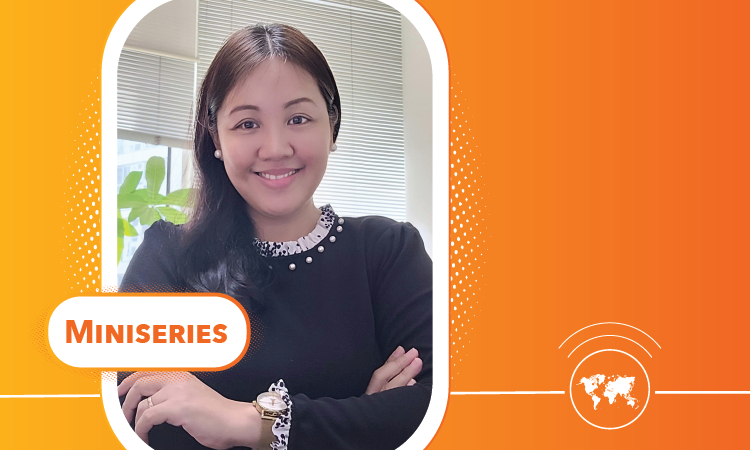
September 28, 2022 - 12:28 min.
Transcript – Download
After 19 years of employment for Global Affairs Canada, Wilma Ty-Cañadilla has kindly volunteered to take over a GAC Files podcast to share the reality of being a locally engaged staff member working for the Embassy to the Philippines, in Manila. A designated migration officer, Wilma has many great stories. Her job allows her to make a difference in the lives of applicants who seek to come to Canada for better education and employment opportunities and or to be reunited with family and loved ones.
Emmanuelle Tremblay, Team Lead and contact person for locally engaged staff members at Global Affairs Canada, talks with Wilma Ty-Cañadilla in Manila, Philippines.
Episode 2: The unique journey of Maddie Morris
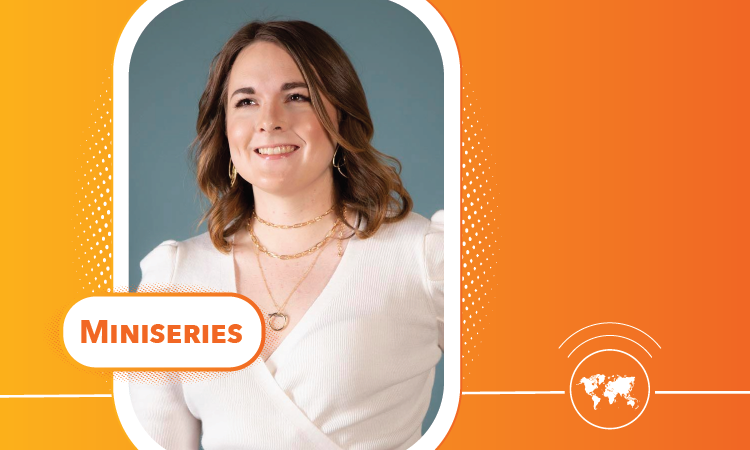
October 5, 2022 - 12:28 min.
Transcript – Download
In this episode, a trade commissioner based in the Consulate General in Los Angeles will share with us her special story. Previously based in Seattle, Washington, managing aerospace and advanced engineering relations in the U.S. Pacific Northwest, Maddie Morris became one of the first trade commissioners to openly transition genders while serving in that role. Working for the government of an inclusive country like Canada was important and reassuring for her during this important journey. Her passion for international relations makes her a great asset to the locally engaged staff community.
Emmanuelle Tremblay, Team Lead and contact person for locally engaged staff members at Global Affairs Canada, talks with Maddie Morris in Los Angeles, United States.
Episode 3: The unique journey of Maxim Cambor
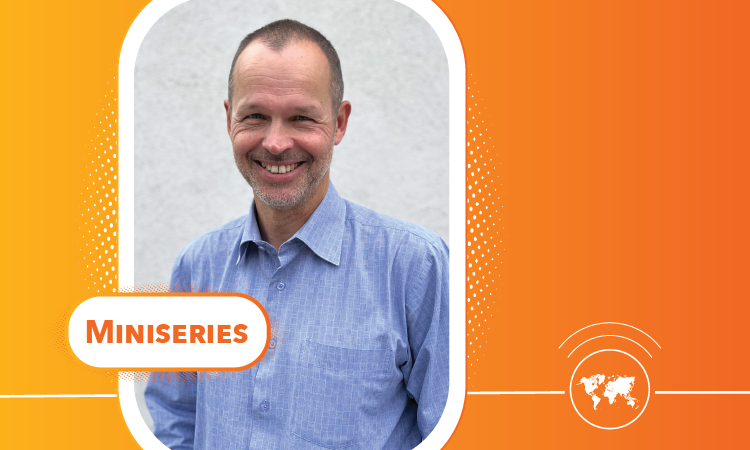
October 12, 2022 - 12:28 min.
Transcript – Download
The unique reality of Maxim Cambor, a locally engaged staff member from Prague, in the Czech Republic, will be featured in this short episode. Serving Canada and Canadians in Prague for 25 years as an accountant, an office manager and now a common services officer, Maxim’s journey is similar to that of so many dedicated locally engaged staff members. He has so far worked for 8 Canadian ambassadors to the Czech Republic.
Emmanuelle Tremblay, Team Lead and contact person for locally engaged staff members at Global Affairs Canada, talks with Maxim Cambor in Prague, Czech Republic.
Episode 54: Locally Engaged Staff: Serving Canada Around The World
This episode presents the remarkable and unique reality of 3 locally engaged staff members from around the world. Each in their own way, they serve Canada and Canadians through their meaningful presence abroad. The world of locally engaged staff is diverse in terms of cultural history, and their life experiences can be very different from that of Canadian diplomats or other Canadian public servants.
Emmanuelle Tremblay, Team Lead and contact person for locally engaged staff at Global Affairs Canada, talks with Blanchine Mazanga, Bjorn Hernes and Caroline Urlacher.
June 15, 2022 - 30:09 min.
Transcript – Download
Episode 53: Excellence and success in Canadian Black-owned international businesses
David Morrison, Deputy Minister of International Trade, welcomes Sara Wilshaw, Chief Trade Commissioner, as well as 2 CEOs of Black-owned businesses, Karima-Catherine Goundiam and Diemo Honore, who share their stories on what makes businesses able to expand into new markets and the support that was provided to their companies.
February 25, 2022 - 27:12 min.
Transcript – Download
Episode 52: A chat with the department's GCWCC champion, co-champion and employee volunteers
Wondering how this year's Government of Canada Workplace Charitable Campaign (GCWCC) is being carried out during our current pandemic situation and how your contributions are helping? Then tune in to the latest GAC Files episode, hosted by John Hannaford. Listen to the Deputy Minister's chat with GAC's GCWCC champion, Mala Khanna, and co-champion, Marissa Fortune, along with GAC employees Hasnat Johnson and Jérémie Bérubé, who share their stories of the real and positive impact of making a charitable contribution.
December 8, 2021 - 23:40 min.
Transcript – Download
Episode 51: A chat with Deputy Minister Daniel Quan-Watson on anti-Asian racism
Deputy Minister John Hannaford welcomes Daniel Quan-Watson, Deputy Minister of Crown-Indigenous Relations and Northern Affairs Canada (CIRNAC), to talk about how his journey in the federal government is helping build a respectful and inclusive work environment and learn from his experiences, as well as tools and best practices he has implemented that will contribute to our internal dialogue at Global Affairs Canada.
November 26, 2021 - 30:35 min.
Transcript – Download
Episode 50: A chat with Kristina Casey and Dan Danagher on New and Innovative Ways of Working
Deputy Minister John Hannaford welcomes Kristina Casey, Former Director General, Information Management and Information Technology (IM/IT), now Assistant Deputy Minister in Client Service Delivery and Management Sector at Shared Services Canada and Dan Danagher Assistant Deputy Minister of international platform, to talk about new initiatives currently underway that are expected to have a real and positive impact on employees’ lives in the next 1-2 years, taking into account 21st century realities, including digitization of our work.
November 4, 2021 - 27:22 min.
Transcript – Download
Episode 49: A chat with Brent Robson on the Canadian COVID-19 repatriation operation
In this special National Public Service Week episode, Deputy ministers John Hannaford and Christopher MacLennan welcome Brent Robson, Director of Emergency Operations, and Anne-Marie Spain, who was the management consular officer in Morocco at the time of several repatriation flights in 2020, to talk about their experiences with the largest peacetime repatriation effort in Canada’s history.
June 18, 2021 - 28:52 min.
Transcript – Download
Episode 48: A chat with Ambassador Bob Rae on mental health
Deputy Minister John Hannaford welcomes Bob Rae, Ambassador and Permanent Representative of Canada to the United Nations in New York, to talk about his personal struggles with mental health and the importance of openly discussing these issues—especially in the context of the COVID-19 pandemic.
May 4, 2021 - 27:26 min.
Transcript – Download
Episode 47: About the Anti-Racism Secretariat and work at GAC on combatting racism
Deputy Minister John Hannaford welcomes Head of the Anti-Racism Secretariat Myriam Montrat and guests to talk about equity, diversity and inclusion efforts at Global Affairs Canada. Through their personal stories and experiences with the secretariat, participants share their thoughts on departmental actions to combat systemic racism and racial discrimination in the workplace.
April 8, 2021 - 40:57 min.
Transcript – Download
Episode 46: A chat with Marta Morgan and LGBTQ2+ Champion Stewart Wheeler and guests
Deputy Ministers John Hannaford and Marta Morgan welcome LGBTQ2+ Champion Stewart Wheeler and guests to talk about diversity and inclusion at Global Affairs Canada. Through their personal stories, participants share what it’s like to work at the department as a member of the LGBTQ2+ community.
February 24, 2021 - 48:00 min.
Transcript – Download
Episode 45: Chat with GCWCC Champion Duane McMullen and volunteers
Deputy Minister John Hannaford welcomes Duane McMullen, Global Affairs Canada’s Government of Canada Workplace Charitable Campaign (GCWCC) Champion, as well as campaign volunteers who share their touching stories on the real and positive impact of the campaign.
December 18, 2020 - 19:26 min.
Transcript – Download
Episode 44: Managing a new team at Global Affairs Canada during the pandemic
Deputy Minister John Hannaford welcomes Daniel Campeau, Deputy Director of the Office of Values, Ethics and Workplace Well-being, and colleagues from Headquarters, our Toronto regional office and our mission in Russia, to discuss their experiences integrating and managing new teams, for the most part virtually, during the pandemic.
December 1, 2020 - 26:53 min.
Transcript – Download
Episode 43: Chat with André Frenette and HQ staff
Representatives from Global Affairs Canada’s Human Resources and 2 other departmental branches discuss with Deputy Minister John Hannaford and co-host André Frenette, Director General and Coordinator of the COVID-19 Task Force, about the programs and measures in place at headquarters buildings, as well as their experiences following their return to the office.
October 29, 2020 - 35:39 min.
Transcript – Download
Episode 42: Chat with André Frenette and missions abroad
Representatives from Global Affairs Canada missions in Panama and in Ukraine share with Deputy Minister John Hannaford and co-host André Frenette, Director General and Coordinator of the COVID-19 Task Force, their unique experiences following their return to the office, as well as how they managed to remain resilient and overcome challenges in the context of the COVID-19 pandemic.
October 16, 2020 - 33:43 min.
Transcript – Download
Episode 41: Chat with Antoine Mindjimba
Antoine Mindjimba, diversity and inclusion and culture lead for EY Canada, shares compelling examples from the private sector on ways to overcome racial discrimination and provides insight into fostering an inclusive workplace, including through organizational culture change.
July 22, 2020 - 20:52 min.
Transcript – Download
Episode 40: Chat with Kevin Lunianga, with guest host Deputy Minister Leslie MacLean
On this special episode of the GAC Files, watch a candid and powerful conversation between guest host Leslie MacLean, Deputy Minister of International Development, and Kevin Lunianga, Senior Operations Officer, Emergency Operations. Kevin shares his experiences as a Black Canadian and talks about what it means to be allies and to work together to #EndRacism.
June 29, 2020 - 30:52 min.
Transcript – Download
Episode 39: Chat with Charlène Janvier, Bruce Murdock and Luc Raymond
On this episode of GAC Files, host John Hannaford welcomes Charlène Janvier, Bruce Murdock and Luc Raymond from Global Affairs Canada. This special edition of the podcast continues the dialogue begun at the deputy ministers’ May 22 livestreamed town hall, as John and his 3 guests discuss the top questions submitted by employees but not answered during the event.
June 16, 2020 - 26:49 min.
Transcript – Download
Episode 38: Chat with Amanda Strohan
How are our missions abroad helping thousands of Canadians return home during the global COVID-19 pandemic? Tune in to the latest GAC Files episode as Amanda Strohan, Management Consular Officer at the High Commission of Canada in India (DELHI), provides a glimpse of the challenging, but vital, work she and her team are doing on the ground. #TogetherApart #StayStrong.
June 4, 2020 - 10:47 min.
Transcript – Download
Episode 37: Chat with Marta Morgan, Deputy Minister of Foreign Affairs
What does being diagnosed with #COVID19 feel like? GAC Files host John Hannaford has a candid conversation with Marta Morgan, Deputy Minister of Foreign Affairs, on her personal experience and her recovery from the virus. She also shares her thoughts on how Global Affairs Canada employees have adapted and contributed to help Canadians weather the storm from near and far. #TogetherApart #StayStrong
April 27, 2020 - 14:42 min.
Transcript – Download
Episode 36: Chat with Annie Lirette
Balancing the demands of a busy family and working from home is a challenge for many during the COVID-19 pandemic. Annie Lirette, from Global Affairs Canada’s Quebec regional office, shares her daily routine of how she stays healthy and focused. Find out how she and her colleagues are using social media to stay connected and positive.
April 24, 2020 - 7:46 min.
Transcript – Download
Episode 35: Chat with Laurent-Gabriel Côté-Fournier
Returning to Canada in the midst of the COVID-19 crisis is a difficult decision to make. Global Affairs Canada employee Laurent-Gabriel Côté-Fournier speaks about the decision to move back home with his young family from Addis Ababa, Ethiopia, living in quarantine and striving for a sense of normality.
April 15, 2020 - 8:55 min.
Transcript – Download
Episode 34: not available
Episode 33: Chat with Daniel Campeau
The COVID-19 crisis affects us all. Daniel Campeau of Global Affairs Canada’s Office of Values, Ethics and Workplace Well-being speaks about his own experience of living in quarantine after returning from travel outside Canada and the support available to employees and their families in adjusting to the new normal.
April 7, 2020 - 13:16 min.
Transcript – Download
Episode 32: Chat with Chris Moran
Adapting to the new workplace reality of the COVID-19 crisis can be challenging. Find out how Chris Moran of Canada’s Trade Commissioner Service is balancing the responsibilities of work and parenting in the home-based workplace.
April 2, 2020 - 8:59 min.
Transcript – Download
Episode 31: Chat with the Trade Commissioner Service: Ailish Campbell and the Atlantic Canada Regional Office
We’re talking all things trade on this special podcast highlighting the 125th anniversary of the founding of Canada’s Trade Commissioner Service. Explore with us and find out how Canada #TCS125 is at the cutting edge of innovation with its global network abroad, its Canadian technology accelerators around the world, and its ocean and technology superclusters.
February 25, 2020 - 30:05 min.
Transcript – Download
Episode 30: Chat with Sandra McCardell and Sarah Taylor
Check out the latest #GACFiles podcast with Sandra McCardell and Sarah Taylor, Global Affairs Canada’s incoming and outgoing champion for women. They chat about their roles as champion, initiatives changing the face of GAC and gender equity progress in the department.
January 09, 2020 - 16:52 min.
Transcript – Download
Episode 29: Chat with Caroline Leclerc, Myriam Pineault-Latreille and Harkiran Rajasansi
On this special episode of the GAC Files, 3 dynamic champions for the GAC Government of Canada Workplace Charitable Campaign chat with host John Hannaford about why they’ve taken on this year’s campaign challenge. Don’t miss a minute of the podcast as Caroline Leclerc, Myriam Pineault-Latreille and Harkiran Rajasansi share personal stories, encourage us to lift up our communities and remind us how each donation, small or large, has a positive impact on the lives of people in need.
November 27, 2019 - 18:09 min.
Transcript – Download
Episode 28: Chat with Deputy Minister Marta Morgan
Join the latest #GACFiles conversation with host John Hannaford, Deputy Minister of International Trade, and special guest Marta Morgan, Deputy Minister of Foreign Affairs. Get to know Marta as she shares some of her hobbies, talks about her go-to podcasts and provides insight into how she built her career by pursuing interesting challenges. Hear what she thinks about leading the department in a complex world environment, the expertise of GAC employees and the unique role senior leaders play in shifting the culture for a greater understanding of mental health and workplace well-being.
November 6, 2019 - 20:11 min.
Transcript – Download
Episode 27: Chat with Deputy Minister John Hannaford, with guest hosts Cassandra Morin and Brandon Cove
This week on the #GACFiles, the tables are turned as representatives of the Young Professionals Network (YPN), Cassandra Morin and Brandon Cove ask host John Hannaford to talk about his illustrious career in the public service and how he maintains a healthy work-life balance. John highlights the importance of mentorship and encourages young professionals not to limit their career opportunities.
August 12, 2019 - 29:25 min.
Transcript – Download
Episode 26: Chat with Manon Dumas
On the latest #GACFiles, host John Hannaford engages with Manon Dumas from Special Projects about Global Affairs Canada’s Dialogue Series on Uncomfortable Topics. They chat about the importance of working together as a community to address questions of workplace harassment and other sources of tension. They also talk about how to strengthen our processes, tools and culture so that we can make GAC a better place to work.
July 12, 2019 - 34:58 min.
Transcript – Download
Episode 25: Chat with Heather DiPenta and Louise Blais
Check out GAC Files latest episode as our new host John Hannaford, Deputy Minister of International Trade, has a candid discussion on mental health with special guests Heather DiPenta, Director of Values and Ethics and Workplace Well-Being, and Louise Blais, Ambassador and Deputy Permanent Representative to the Permanent Mission of Canada to the UN in New York. Find out more about Louise’s personal journey and challenges with mental illness, the importance of destigmatizing, reaching out, supporting each other and speaking up about what mental health really is.
May 08, 2019 - 34:50 min.
Transcript – Download
Episode 24: Chat with Antoine Pouliot
On the latest GAC Files podcast, Antoine Pouliot, Strategist, Advocacy and Cultural Diplomacy, talks about how his previous work in the private and non-profit sectors led him to his current role promoting Canadian art and culture through our missions abroad.
March 11, 2019 - 32:33 min.
Transcript – Download
Episode 23: Chat with Canada Beyond 150 participants Aleena Esmail, Andreia Santos, Poya Saffari and Roxanne Hamel
On this episode of the GAC Files, Aleena Esmail, Andreia Santos, Poya Saffari and Roxanne Hamel, young Global Affairs Canada public servants, discuss Canada Beyond 150: Policy for a Diverse and Inclusive Future, which is an incredible opportunity to contribute to complex issues using foresight, design thinking and co-creation. Find out more about their contributions—providing unique ideas and diverse solutions, working cross-functionally and collaborating to tackle issues and create policies that serve Canadians.
February 19, 2019 - 36:18 min.
Transcript – Download
Episode 22: Chat with Jean-Dominique Ieraci
Join the latest conversation, with guest Jean-Dominique Ieraci, Deputy Head of Mission and Minister Counsellor (Trade), as he chats about trade diplomacy, the Trade Commissioner Service and its evolution, as well as the importance of having the right manager and mentor to guide you with frank conversations throughout your career.
February 12, 2019 - 33:28 min.
Transcript – Download
Episode 21: Chat with Alison LeClaire
Host David Morrison talks with Alison LeClaire, Senior Arctic Officer and Director General for Arctic, Eurasian and European Affairs, about her experiences during her postings in South Africa and Latin America, her perspective as a woman working in foreign service while raising a family and her new challenge in one of the department’s most interesting bureaus.
December 24, 2018 - 28:43 min.
Transcript – Download
Episode 19: Chat with Marcy Grossman
Host David Morrison talks with Marcy Grossman, Consul General, on the importance of trade and Canada’s economic ties with the United States, how all politics is local, having ambition and her remarkable leadership of locally engaged staff.
November 26, 2018 - 40:04 min.
Transcript – Download
Episode 18: Chat with Paul Maddison
Host David Morrison chats with Paul Maddison, Canada’s High Commissioner in Australia, about trading a naval career for diplomacy and how he successfully made the transition.
November 7, 2018 - 31:06 min.
Transcript – Download
Episode 17: Chat with Deborah Chatsis
This week in the GAC Files, host David Morrison talks with guest Deborah Chatsis, who shares her experiences as an Indigenous woman in her postings abroad, her fascinating career and her work advocating for a foreign service that is reflective of Canada and its demographics.
October 26, 2018 - 27:30 min.
Transcript – Download
Episode 16: Chat with Peter Boehm
This week on the GAC Files, host David Morrison exchanges views with former deputy minister Peter Boehm, in front of a live Global Affairs Canada audience, as he reflects on a 37-year career with the department. Find out more about Peter’s legacy of leadership and inspiration to the Global Affairs Canada family, destigmatizing mental health and offering his impressions of the evolution of our department.
October 11, 2018 - 23:36 min.
Transcript – Download
Episode 15: Chat with Rasha Al-Katta
Follow the exchange between David Morrison and his latest GAC Files guest, Rasha Al-Katta, as they discuss being a millennial Global Affairs Canada person and her vision of life, including inclusiveness, focusing on youth and the positive, working with refugees and being a volunteer guru.
October 3, 2018 - 31:37 min.
Transcript – Download
Episode 14: Chat with Myriam Pineault-Latreille and Deena Allam
Host David Morrison chats with Myriam Pineault-Latreille and Deena Allam about a variety of topics, including being young professionals at Global Affairs Canada, the Next Gen Youth network and their outlook on the department, including their views on the importance of diversity.
September 21, 2018 - 31:29 min.
Transcript – Download
Episode 13: Chat with Shauna Hemingway
Host David Morrison talks with Shauna Hemingway about how following her passions led her to great opportunities in communications, trade and ultimately a career in foreign service as head of mission to the Dominican Republic.
August 30, 2018 - 29:09 min.
Transcript – Download
Episode 12: Chat with Kumar Gupta
Host David Morrison chats with Kumar Gupta about how his training as an engineer led to a career in international development and then to becoming a head of mission. He also chats about his interest in Africa.
August 21, 2018 - 24:16 min.
Transcript – Download
Episode 11: Chat with David Da Silva
Host David Morrison gets together with David Da Silva who talks about starting out in Canada’s foreign service, the importance of putting people first and being co-chair of GAC’s LGBTQ+ employee network.
August 16, 2018 - 33:44 min.
Transcript – Download
Episode 10: Chat with Sacha Levasseur-Rivard
Host David Morrison interviews Sacha Levasseur-Rivard about his career path from journalist to foreign service officer in Canada’s diplomatic corps. Sacha speaks about the importance of mentorship, giving young people a voice and the value of humility.
August 2, 2018 - 34:29 min.
Transcript – Download
Episode 9: Chat with Sebastien Beaulieu
Host David Morrison talks with Canada’s Executive Coordinator for Syria Sebastien Beaulieu about the challenges of raising children in a household where both parents are career diplomats, balancing teaching with diplomacy and promoting diversity and inclusion in the Middle East.
July 24, 2018 - 30:03 min.
Transcript – Download
Episode 8: Chat with Jennifer Kleniewski
Host David Morrison talks with Jennifer Kleniewski, a self-described foreign service brat, about growing up abroad and then finding her own career path with the department’s Critical Incidents Task Force. It’s the team that coordinates Canada’s whole of government response to critical incidents, such as hostage takings and kidnappings.
July 16, 2018 - 32:31 min.
Transcript – Download
Episode 7: Chat with Heather DiPenta
Host David Morrison interviews Heather DiPenta about how her start in the public service as an ergonomist led to her current position as Global Affairs Canada’s lead on values and ethics, her thoughts on mental health and why addressing harassment in the workplace is so important.
July 9, 2018 - 36:55 min.
Transcript – Download
Episode 6: Chat with Craig Kowalik
Host David Morrison gets together with Craig Kowalik, Team Leader of the Missions of the Future Project, to chat about his time in Venezuela and being a diplomat there, serving the Prince of Wales and his interest in using international development to promote democracy.
June 28, 2018 - 29:07 min.
Transcript – Download
Episode 5: Chat with Patricia Peña
Host David Morrison chats with Patricia Penã, Canada’s Ambassador to Chile, about being raised by immigrant parents in Toronto, her years with the United Kingdom Electoral Commission and her interest in democratic governance and human rights issues. You may notice a small issue with the audio on the podcast (due to a technical difficulty). But rest assured the conversation is as lively as always.
June 20, 2018 - 28:22 min.
Transcript – Download
Episode 4: Chat with Janice Charette
Host David Morrison talks with Janice Charette, Canada’s High Commissioner to the United Kingdom, about her earlier job as head of the public service, mental health, and spotting talent.
June 13, 2018 - 36:42 min.
Transcript – Download
Episode 3: Chat with Francis Trudel
Host David Morrison interviews Francis Trudel about his journey from his career with Canada’s National Defence to taking the helm of Global Affairs Canada’s Human Resources Branch.
June 5, 2018 - 36:18 min.
Transcript – Download
Episode 2: Chat with Peter M. Boehm
Host David Morrison gets together with Peter M. Boehm, Deputy Minister for the G7 Summit and Personal Representative of the Prime Minister, to chat about how he got started in the foreign service, balancing a career while raising a special needs child and the challenges of being Canada’s G7 sherpa.
May 28, 2018 - 28:48 min.
Transcript – Download
Episode 1: Chat with Stefanie Beck
Host David Morrison chats with Stefanie Beck, Assistant Deputy Minister of Europe, Arctic, Middle East and Maghreb Branch, Global Affairs Canada, about becoming a head of mission at the age of 34, balancing work and life as a single mother, her decision to leave Global Affairs Canada and then come back.
May 18, 2018 - 29:43 min.
Transcript – Download
Episode 0: Introduction to the GAC Files
Host David Morrison explains what the GAC Files is all about.
June 4, 2018 - 13:25 min.
Transcript – Download





